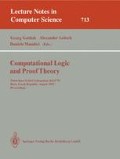Abstract
We propose techniques to provide calculi based on the connection method with a possibility to preclude infinite loops. We extend previous work — proposed in the field of Logic Programming — concerning the detection of infinite loops during the proof of Horn formulas. On the one hand, we present a technique to be integrated into connection calculi for full first-order logic. On the other hand, we show how dependencies between goals can be used to yield stronger pruning techniques.
This research was supported by the Deutsche Forschungsgemeinschaft (DFG) within project KONNEKTIONSBEWEISER under grant no. Bi 228/6-1.
Preview
Unable to display preview. Download preview PDF.
References
P. Besnard: On infinite loops in logic programming, IRISA, Publ. Interne 488, 1989.
W. Bibel: Automated Theorem Proving, Vieweg Verlag, Braunschweig, second edition, 1987.
W. Bibel: Deduction: Automated Logic, Academic Press, London, 1993.
R. N. Bol, K. R. Apt, and J. W. Klop: An analysis of loop checking mechanisms for logic programs, Theoretical Computer Science 86, 35–79, 1991.
R. N. Bol: Loop Checking and Negation, JLP, 15:147–175, 1993.
S. Brüning: Search Space Pruning by Checking Dynamic Term Growth, Technical Report AIDA-92-19, TH Darmstadt, to appear in proceedings of LPAR'93.
S. Brüning: On Loop Detection in Connection Calculi, Technical Report, TH Darmstadt, in preparation.
D. R. Brough and A. Walker: Some practical properties of logic programming interpreters, Proc. Conf. on Fifth Generation Computer Systems, 149–156, 1984.
M. A. Covington: Eliminating unwanted loops in logic programming, Sigplan Notices 20 (1), 22–26, 1985.
R. Letz and J. Schumann and S. Bayerl and W. Bibel: SETHEO: A High-Performance Theorem Prover, Journal of Automated Reasoning 8, 1992.
G. Neugebauer: From Horn Clauses to First Order Logic: A Graceful Ascent, Technical report, Darmstadt, 1992.
J. A. Robinson: A machine-oriented logic based on the resolution principle, Journal of the ACM, 12(1), 23–41, 1965.
D. E. Smith and M. R. Genesereth and M. L. Ginsberg: Controlling recursive inference, Artificial Intelligence, 30, 343–389, 1986.
M. E. Stickel: A PROLOG technology theorem prover: implementation by an extended PROLOG compiler, Journal of Automated Reasoning, 4, 353–380, 1988.
L. Vieille: Recursive Query Processing: The Power of Logic, ECRC Munich, Technical Report TR-KB-17, 1987.
Author information
Authors and Affiliations
Editor information
Rights and permissions
Copyright information
© 1993 Springer-Verlag Berlin Heidelberg
About this paper
Cite this paper
Brüning, S. (1993). On loop detection in connection calculi. In: Gottlob, G., Leitsch, A., Mundici, D. (eds) Computational Logic and Proof Theory. KGC 1993. Lecture Notes in Computer Science, vol 713. Springer, Berlin, Heidelberg. https://doi.org/10.1007/BFb0022562
Download citation
DOI: https://doi.org/10.1007/BFb0022562
Published:
Publisher Name: Springer, Berlin, Heidelberg
Print ISBN: 978-3-540-57184-1
Online ISBN: 978-3-540-47943-7
eBook Packages: Springer Book Archive

